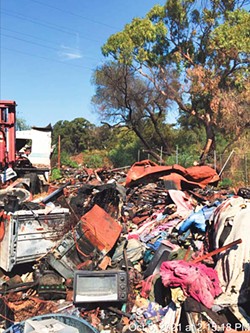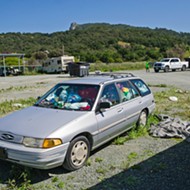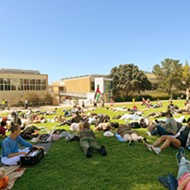[{
"name": "Newsletter Promo",
"id": "NewsletterPromo",
"class": "inlineCenter",
"insertPoint": "4",
"component": "15264767",
"requiredCountToDisplay": "0"
},{
"name": "Ad - Medium Rectangle CC01 - 300x250",
"id": "AdMediumRectangleCC01300x250",
"class": "inlineCenter",
"insertPoint": "8",
"component": "2963441",
"requiredCountToDisplay": "12"
},{
"name": "Ad - Medium Rectangle LC01 - 300x250",
"id": "AdMediumRectangleCC01300x250",
"class": "inlineCenter",
"insertPoint": "18",
"component": "2963441",
"requiredCountToDisplay": "22"
},{
"name": "Ad - Medium Rectangle LC09 - 300x250",
"id": "AdMediumRectangleLC09300x250",
"class": "inlineCenter",
"insertPoint": "28",
"component": "3252660",
"requiredCountToDisplay": "32"
}]
Long-simmering concerns about a "dangerous" property located next door to the 40 Prado Homeless Center in San Luis Obispo have now spilled into court.
The city of SLO filed a lawsuit in September against local landowner William Sievers—asking a judge to appoint a receiver to take over his 2.2-acre lot and address a "never-ending litany of health and safety concerns" there.
Two creekside fires, more than 100 calls for police response, and dozens of documented code violations at the property since 2020 forced the city's hand, officials said.
"We really have gone above and beyond to try to avoid doing this," SLO City Attorney Christine Dietrick told New Times. "Taking control of someone's property is a significant step and one we take very, very seriously. This property is beyond his capacity to manage."
Sievers—who leases the land to tenants and also uses it to store large quantities of industrial materials, like old cars and machine parts—told New Times that he entrusted his space to the wrong people and now is in the process of cleaning it up.
He said that he recently evicted various tenants and squatters, who he labeled as "liars and thieves," after a long court battle.
"I've been too patient and tolerant, or lenient, with people and then they take advantage of that," said Sievers, who resides on O'Connor Way. "I've lost so many tens of thousands of dollars. They've stolen most everything of value."
Sievers said that his father purchased the Prado Road lot in the early 1980s, and he's used it over the years as a "campus" for his industrial projects. He likes to fix up and repurpose recycled items, and has invited people who are down on their luck to live on the site and help with the work.
"I want to share space with people who have similar motivations in life," Sievers said. "I don't like the word 'hoarder.' I want to protect the present. A lot of people don't understand what I'm doing. They think I'm an eccentric crazy person."
The property abuts San Luis Creek and shares a fence line with the 40 Prado Homeless Center. It's been on the city's police and code enforcement radar since at least 2017.
According to the city's lawsuit, the lot is so cluttered with materials that it's blocking access for emergency vehicles, which became a real issue when two fires broke out on the property in 2020 and 2021.
Both fires were "difficult to access and suppress" for firefighters due to the "large amounts of debris, junk, and inoperable vehicles on the property," the lawsuit stated.
"That's a really top-tier concerning priority," Dietrick said.
Criminal activity is also rampant, according to SLO officials. Between January 2020 and September 2022, police responded to the property 111 times on reports of theft, fighting, trespassing, drug use, weapon discharges, and other complaints.
The unsafe behaviors are spilling over and affecting operations at the neighboring 40 Prado Homeless Center, according to Jack Lahey, director of homeless services at the CAPSLO-owned shelter.
Lahey told New Times that neighbor-to-neighbor relations with Sievers' property took a turn for the worse during the pandemic.
"A lot of the issues we deal with are spillover from that property—issues with people getting into fights, drug activity, drug dealing across the properties," Lahey said. "A lot of chaos over there spills into our parking lot. There was a time when people cut a hole in the fence and blocked our driveway to offload stuff from his property."
While Lahey believes that Sievers has "good intentions," he thinks he's overwhelmed and said he's supportive of the city's lawsuit to improve safety at the property.
Sievers didn't deny the activities that allegedly occurred on his land, but he said he's lacked support to address them. He said his efforts to get the police to stop the criminal activity and the courts to authorize evictions have been "stymied."
"The cops said they're scared to go there at night. How do you think I feel then?" Sievers said. "They've never really helped at all. I need some assistance."
An ex-parte hearing on the city's request for a receiver is scheduled for Dec. 14. Dietrick said that receivership is the best way forward for the property and the community after years of trying to work with Sievers to clean up the site.
"It's been pretty clear for some time that it's just beyond his capacity at this stage to remediate," Dietrick said. "There have been periods of time when he's made a decent dent. But it's never been sustained. And at this point we just don't think it's sustainable."
If the court agrees, a receiver could take out loans against the property to carry out the work necessary to fix the violations. The city and receiver would submit a work plan to the court that, among other things, would have to "address the relocation of any tenants."
To Sievers, that route sounds prohibitively expensive, especially when he feels like he's finally making progress.
"I am really worried about it because they have expensive attorneys," he said. "It's going to run up huge bills. I'm broke." Δ
Assistant Editor Peter Johnson can be reached at [email protected].
Latest in News
Comments (2)
Showing 1-2 of 2
Readers also liked…
-

Coast Unified teachers upset over new position's salary and qualifications
Oct 20, 2022 -

SLO police identify alleged driver who hit and killed couple
Dec 22, 2022 -

When the levee breaks: Oceano residents, county officials walk a tightrope of regulations to manage Arroyo Grande Creek, which some say led to the levee's failure in January
May 18, 2023










